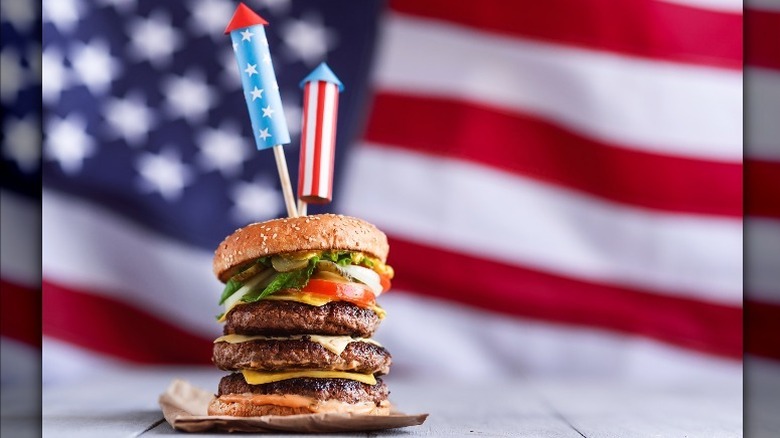The Complicated Origins Of Hamburgers
The hamburger is genius in its simplicity. Who would have thought that a ground beef patty squashed between two halves of a bun would be so delicious? No one short of a culinary mastermind, that's who. Hamburger lovers around the globe have benefitted from their creator's beefy brilliance ever since. And the U.S., in particular, is a nation greatly indebted to the hamburger's inventor.
Indeed, the U.S. boasts some burger stats that will blow your mind. According to USA Today, Americans eat roughly 50 billion burgers each year, which roughly averages at 156 hamburgers per person. In addition to this, the outlet reported that in 2019, Nevada touted the highest number of hamburgers eaten annually per capita out of all 50 states at 267 per person each year. (West Virginia, which ranked the lowest, reported 171 hamburgers per capita — which still equates to a burger eaten every other day.)
Yes, it seems that a large number of U.S. residents would say that life is much better with hamburgers in it. But how did the burger become so ubiquitous in American culture? Who created the first hamburger — the ancient progenitor of the Big Mac, the Whopper, and the Double-Double? Apparently, it's complicated.
The Hamburg steak is an ancestor of the modern burger
The origins of the hamburger are rather fuzzy — partly because it seems that everyone wants to lay claim to this cultural icon. Speaking with The Washington Post in 2021, filmmaker and hamburger expert George Motz pointed out that the first possible mention of the hamburger can be traced back to ancient Rome. Per Motz, a Roman cookbook dating back to the first century B.C.E. contains a recipe "suspiciously close to the modern burger, a minced-meat patty blended with crushed nuts" which is "heavily spice and cooked."
The Roman Empire aside, clues about where the modern hamburger came from might be found right in its name. The German city of Hamburg is traditionally credited with introducing the burger to an eager meat-eating audience. According to a 2017 article published by Eater, Hamburg was renowned for its production of top-quality beef during the 19th century. Author Andrew F. Smith, who authored the book "Hamburger: A History," explained to Eater that one of the city's more popular ways to prepare certain cuts was to "chop it up, season it, and form it into patties which were then usually grilled or fried."
But is that all there is to it? Hamburg's patties notwithstanding, it still doesn't tell the whole story of the hamburger — like how it eventually ended up a staple of American cuisine. Or better yet, how the Hamburg patty and bun formed a partnership that would become the burger we know and love today.
When the hamburger met the classic bun
The emigration of the hamburger from Germany to the U.S. was most likely facilitated by German immigrants who came to America in the mid-1800s during a time of political strife in Germany. As it's commonly thought, these newcomers introduced their adopted homeland to German food, including the Hamburg patty — or, as it was marketed in the U.S., the Hamburg chopped steak (via History).
With food carts and restaurants offering Hamburg steak, 19th-century factory workers eagerly looked forward to mealtime. But there was just one problem: How do you eat it while standing up? Apparently, a clever individual began advertising a new way to consume the Hamburg steak: sandwich-style, between slices of bread (via Parade).
While this story might be a bit apocryphal, if it actually happened, this individual could, indeed, be credited for inventing the hamburger. But don't get too excited just yet: There are several communities across the country that claim to have been home to the modern hamburger's creator.
The creator of the hamburger remains a mystery
It's understandably tempting to lay claim to one of America's most iconic foods — but with so many places vying for the title, getting to the heart of the matter is difficult. According to ABC News, a strong contender for being credited as the inventor of the hamburger is Fletcher Davis of Athens, Texas — at least, depending on who you ask. According to the outlet, Davis purportedly first put a hamburger patty on bread in the 1880s and went on to sell his creation at the 1904 World's Fair in St. Louis
But Davis isn't the only one. As ABC News also reported, the city of New Haven, Connecticut, attributes the hamburger to a man named Louis Lassen, who purportedly created the hamburger in 1900. Along with Lassen's descendants, it's a theory that the one and only Library of Congress seemingly concurs with as there's documentation to back up this claim. Meanwhile, a local Wisconsin NBC News affiliate spotlighted another candidate in 2018: a man whose name still remains unknown. In 1885, an individual with the nickname "Hamburger Charlie" flattened a meatball between two slices of bread, and actually gave it the moniker of the "hamburger."
With so many conflicting stories, it's hard to know who has earned your big high-five. It's possible that several people came up with the idea at roughly the same time. Perhaps the real creator's identity has been lost to history, but whoever it was, burger-craving carnivores across the planet are thankful for this drool-worthy invention.



